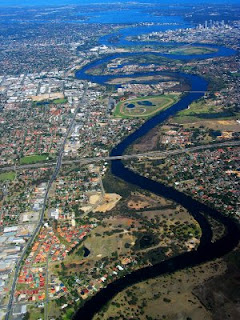Perth's Swan River is often described as the City's playground. The river flows through the centre of the City and meanders over 175 km from the Darling Ranges to the sea at Fremantle.
But the river has been in serious environmental decline for years. The Conservation Council of WA, the state's peak environmental non-government organisations writes:
The main cause of the river’s chronic poor health can be traced to a cocktail of environmental pollutants entering the river system from a range of industrial, agricultural and urban sources. These pollutants’ impact is exacerbated by climate change as we receive less rain in the catchments to flush the nutrients out to sea, and higher temperatures aid algal growth.The consequences of the crises were evident this week with news of massive kills of fish in the river.
During a two week period in July and August this year the Swan River was the site of ecocide- the death of over 10,000 black bream, herring, mullet, grinter, flathead, trumpeter and mulloway killed by toxic algal bloom resulting from industrial chemicals leaching into the river.
Ecocide- large scale destruction of the natural environment- is defined by the lawyer, writer and activist Polly Higgins as:
The extensive destruction, damage to or loss of ecosystems of a given territory whether by human agency or by other causes, to such an extent that peaceful engagement by the inhabitants of that territory has been severely diminished.This was the worst mass fish kill in the Swan River recent years and brings to over 13,000 the number of fish killed in the river since winter started (in June). This is the third such incident in a few months. An earlier incident had resulted in the death of over 1400 black bream. Algal blooms earlier in the year resulted in the deaths of over 5000 fish.
So even a basic analysis suggests that 20,000 fish have died in the Swan River in the first seven months of ths year.
The Swan River Trust, the statutory authority responsible for protecting the health of the Swan River, offered contradictory explanations for the recent deaths.
In early media reports the Trust claimed that the algal bloom was naturally occuring and the result of dry and unseasonal sunny conditions. As the number of deaths escalated the Trust pointed to a combination of causes, including the influx of high levels of nutrient and organics (ie industrial chemicals) and the breakdown of one of its oxygneation plants which props up anemic (near dead) parts of the River.
But other stakeholders questioned the Trust's explanation. Some recreational fisherman pointed to recent spraying activity at large racing, residential and recreational developments along the river.
As the WA Conservation Council points out that the main source of nutrient pollution entering the river is phosphorous and nitrogen-based fertiliser products used in farming and urban environments. These industrial chemicals dissolve readily and are transported through groundwater and surface flows directly into the river.
This problem is compounded by the large number of developments along the river that use fertilisers, including golf courses, parks, racecourses, residential developments, and residential and property developments.
Efforts to get the fertiliser industry to supply more river friendly fertiliser and to take greater responsibility for the problems have failed due to the lack of political will and industry power.
As the Conservation Council points out the fertiliser industry has a vested interest in selling products that pollute the river. The more fertiliser is wasted as run off into the river, the more fertiliser that has to be applied, thereby keeping the profits of the industry flowing.
Rather than address the source of the problem, the Barnett Government has placed the interests and profits of corporations and industry ahead of the health of the Swan River.
The Barnett Government has refused to implement a Plan that would have seen the phasing out of polluting fertilisers on the Perth Coastal Plain by 2011. It has also refused to place any limit on the industry and continues to rely on a failed voluntary regime.
The Conservation Council writes:
Disappointingly, the Minister’s preferred approach does nothing to make the fertiliser industry accountable for the damage done by its products, instead leaving a dying river and a large bill for taxpayer-funded temporary solutions that do not tackle the source of the problem.



No comments:
Post a Comment